Have you ever heard of the phenomenon of choice paralysis? It’s when having too many options makes it is harder to make a decision. This becomes a day-to-day occurrence if you are a developer in today’s time. So, in this article, we’ll discuss two popular back-end technologies: PHP vs Node.js performance, advantages, disadvantages, flexibility, and more.
While they seem unrelated, these technologies have a lot in common. Both are used to build dynamic web applications and are widely adopted by the industry. However, they have distinct differences that can make one a better fit for a particular project.
By exploring the feature comparisons of PHP vs. Node js, we hope to help you make an informed decision when choosing a back-end technology for your next project. Let’s dive right in!
Table of contents
- Overview of PHP vs. Node.js
- What do you need to know about PHP?
- What do you need to know about Node.js?
- Comparison of PHP vs. Node.js
- Conclusion
- FAQs
Overview of PHP vs. Node.js
As a developer, you might have heard that both of these technologies are great options for building back-end systems. But how do you decide which one is right for your project?
PHP is like an old friend. You have known them for a long time ‘cause they have been around for over two decades. So, you know it’s definitely an option you can rely on.
On the other hand, Node.js is like a new flame that has caught your eye. It’s a newer technology that’s been making some sound in the web development world. It’s the shiny new toy that promises to revolutionize the way we build web applications.
An example of how Node.js and PHP can be used in real life is Airbnb and other popular companies like Slack, Facebook, and Wikipedia. They initially used Ruby on Rails, but as their site grew, they faced problems with slow performance. They switched to a Nodejs-based architecture.
That change allowed them to handle more requests and improve their users’ experience. So, PHP vs Node.js performance is an important factor in this debate.
Other popular companies like Slack, Facebook, and Wikipedia use PHP for their back-end development. Slack uses PHP for its real-time communication system, while Facebook uses it as a built-in compiler. Wikipedia uses PHP for its content management system.
So, which one should you choose in the wrestle of Node js vs PHP? It’s a tough decision, of course. But don’t you worry – we’ve got you covered.
PHP vs Node.js: What do you need to know about PHP?
PHP is an open-source server-side scripting language that has been around since the mid-90s. It’s used to build dynamic web applications and is an essential tool for back-end web development.
One of the primary benefits of PHP is its popularity. Below mentioned are some more of PHP’s benefits, followed by its drawbacks you should know about:

Advantages of PHP
Let’s talk about the bright sides of PHP first. Mentioned below are three of the main benefits of PHP and how they can benefit a developer.
Widely used
PHP gained popularity in web development because it was one of the earliest languages designed specifically for the web. In the early days of the internet, most web applications were static HTML pages that couldn’t provide dynamic content or interact with users in real-time. PHP changed that by letting developers embed server-side scripts within web pages to generate dynamic content based on user inputs and other real-time data.
PHP is the most widely used server-side scripting language on the internet today, powering over 77% of websites globally, according to Web Technology Survey. This level of popularity is a testament to PHP’s ability to provide an effective development experience.
Easy installation
Compared to other server-side languages, PHP has one of the easiest installation processes, which makes it a preferred choice for many developers.
One of the main reasons why PHP installation is straightforward is that it’s designed to work with most operating systems, web servers, and databases. This means that you can install PHP on your development machine or server with just a few commands, regardless of the platform you’re using.
PHP also comes with several built-in modules that simplify the installation process further. For example, Composer is a dependency manager tool for PHP that allows you to specify and manage to install or update your packages.
Another significant benefit of PHP’s easy installation is that it allows developers to focus on the core development tasks, rather than spending time on installation and configuration. This can be especially useful when working on time-sensitive projects or with tight deadlines.
Open source
The open-source nature of PHP gives developers several benefits, including access to a vast community of developers who collaborate and share knowledge to enhance the technology. This collaboration gave rise to an extensive library of extensions, frameworks, and plugins that developers, even today, use to build complex and feature-rich web applications.
Moreover, as an open-source technology, PHP gives developers the option to customize and extend the language to meet their specific requirements. This means that developers can create web apps that are tailored to their needs, rather than just relying on off-the-shelf solutions that may or may not meet their requirements.
PHP keeps improving and releasing new versions. Here, you can find the more recent versions of PHP.

Read our blog on how to hire a PHP developer
Disadvantages of PHP
Despite the benefits, the drawbacks also should be spoken about so you can get a fair comparison. Mentioned below are three of the main disadvantages of PHP and how they can affect a developer.
Core behavior
PHP has some inconsistencies in its core behavior that can cause unexpected behavior. For example, PHP treats numbers differently depending on their size, and it can lead to unexpected results in some cases. Additionally, PHP’s operators sometimes behave differently than expected, and the language does not support some features that are present in other programming languages.
Limited debugging tools
The general consensus among developers is that PHP has a poor ability to handle errors. Debugging tools, which are necessary to look for faults and warnings, are missing from PHP. Compared to other programming languages, it is known that PHP offers fewer debugging tools.
Weak Type Checking
In PHP, variables are dynamically typed, which means that a variable can hold any data type, and its data type can change at runtime. For instance, a variable can hold a string at one point and an integer at another point in the code. While this feature can make coding faster, it can also lead to subtle bugs that are difficult to detect.
However, it should be noted that the latest versions have implemented annotations to handle stricter types.
PHP vs Node.js: What do you need to know about Node.js?
Node.js is an open-source, server-side JavaScript runtime environment that uses Google’s V8 JavaScript engine. It allows developers to build highly scalable and event-driven applications using JavaScript.
Let’s explore the good and bad of Node.js to see if it could compare with PHP.
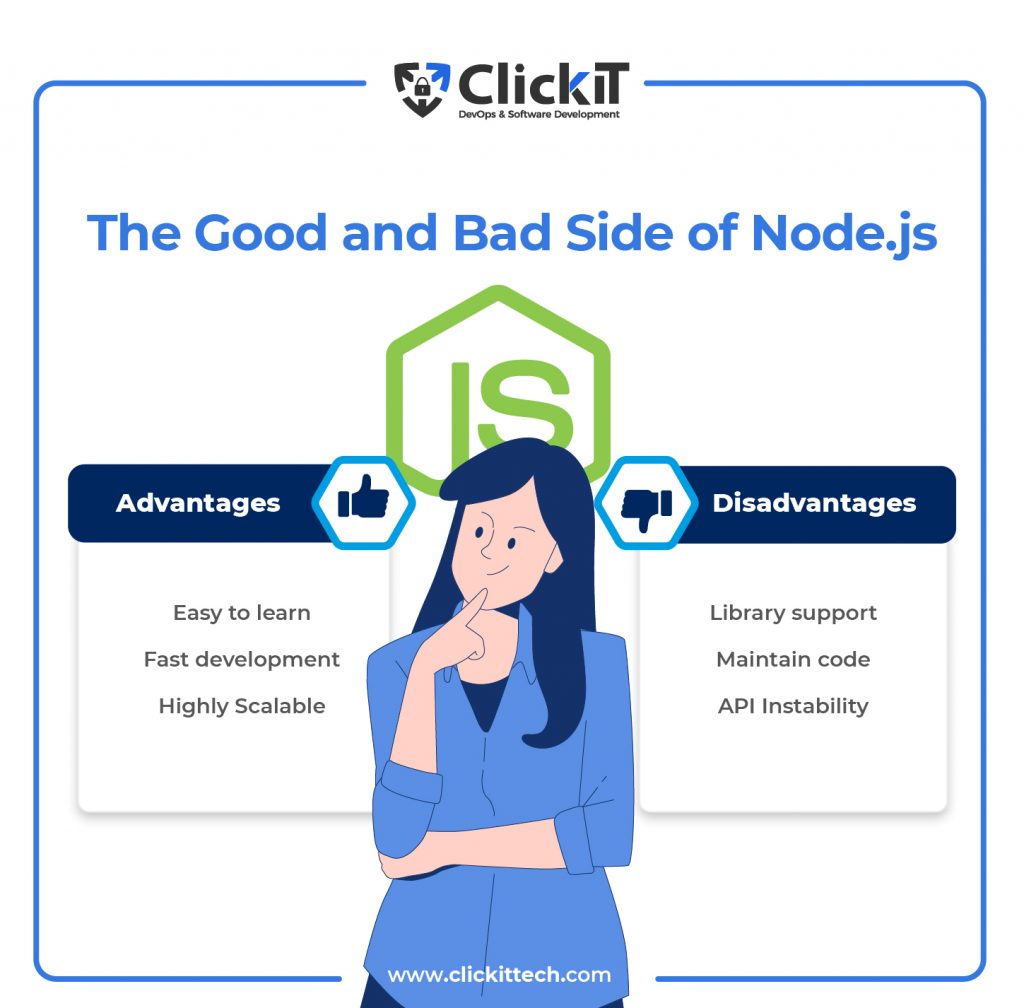
Advantages of Node.js
Following are some of the main benefits of Node.js that you should look out for as a developer.
Easy to learn
Node.js is a JavaScript-based technology, and since JavaScript is a widely used programming language in web development, many developers are already familiar with it. This familiarity makes Node.js an easy-to-learn technology, as developers can reuse their existing JavaScript skills for back-end development. Moreover, Node.js offers a simple and easy-to-understand API, making it easy for developers to get started with it.
Fast development
Node.js has a non-blocking I/O model, which enables the asynchronous processing of data. The non-blocking I/O model allows Node.js to handle multiple connections simultaneously. This makes sure that the application remains responsive and performs well, even under heavy loads.
In addition to that, Node.js offers a rich ecosystem of modules and packages that can be easily integrated into applications. For example, Node.js’s package manager, npm. It’s one of the largest open-source package repositories in the world, with over a million packages available for use.
Node.js’s modular architecture also contributes to its fast development. By breaking down an application into smaller, reusable components, developers can focus on building and testing specific pieces of the application independently rather than building everything at once. This approach can significantly reduce development time and make it easier to maintain and update the application over time.
Read our complete guide to Hire a node.js developer.
Highly Scalable
The Node.js microservices functionality separates the many components of the app into independent services, each of which performs a particular function. This method makes it simpler to grow apps and add new features as required. You can program in one language for both the front end and the back end of a JavaScript application using full-stack development. Its convenience promotes fast data synchronization and makes it simpler to exchange data between the server and the client.

Disadvantages
Mentioned below are three of the main disadvantages of Node.js and how they can affect a developer.
Library support
While there are many useful libraries available for Node.js, such as Express, Socket.io, and Mongoose, there are still areas where library support may be lacking. For example, suppose you’re working with a specific database or API that doesn’t have a Node.js library. In that case, you may have to either build your own library or use a different language or framework.
This can be frustrating for developers who are used to having a wide range of libraries and modules available for other languages and frameworks.
Maintain code
Node.js is a relatively new platform, and best practices for structuring and organizing large Node.js applications are still coming up in the future. In addition to that, the asynchronous programming style used in Node.js can make it more difficult to understand the code. This can lead to difficult-to-debug issues like race conditions and callback hell.
API Instability
As Node.js is a rapidly evolving technology, updates are frequently released to address security concerns, and performance issues, and to introduce new features. However, with each update, there is a risk that some parts of the API may be deprecated or removed, and this can create problems for developers who have built applications on top of those APIs.
Read our blog, why use Node.js to learn more.
Comparison of PHP vs. Node.js
Now, down to the final one-to-one comparison of PHP and Node.js. In this section, we will compare both technologies in terms of PHP vs. Node.js performance, flexibility, security, and hosting ability. Let’s get right into it!
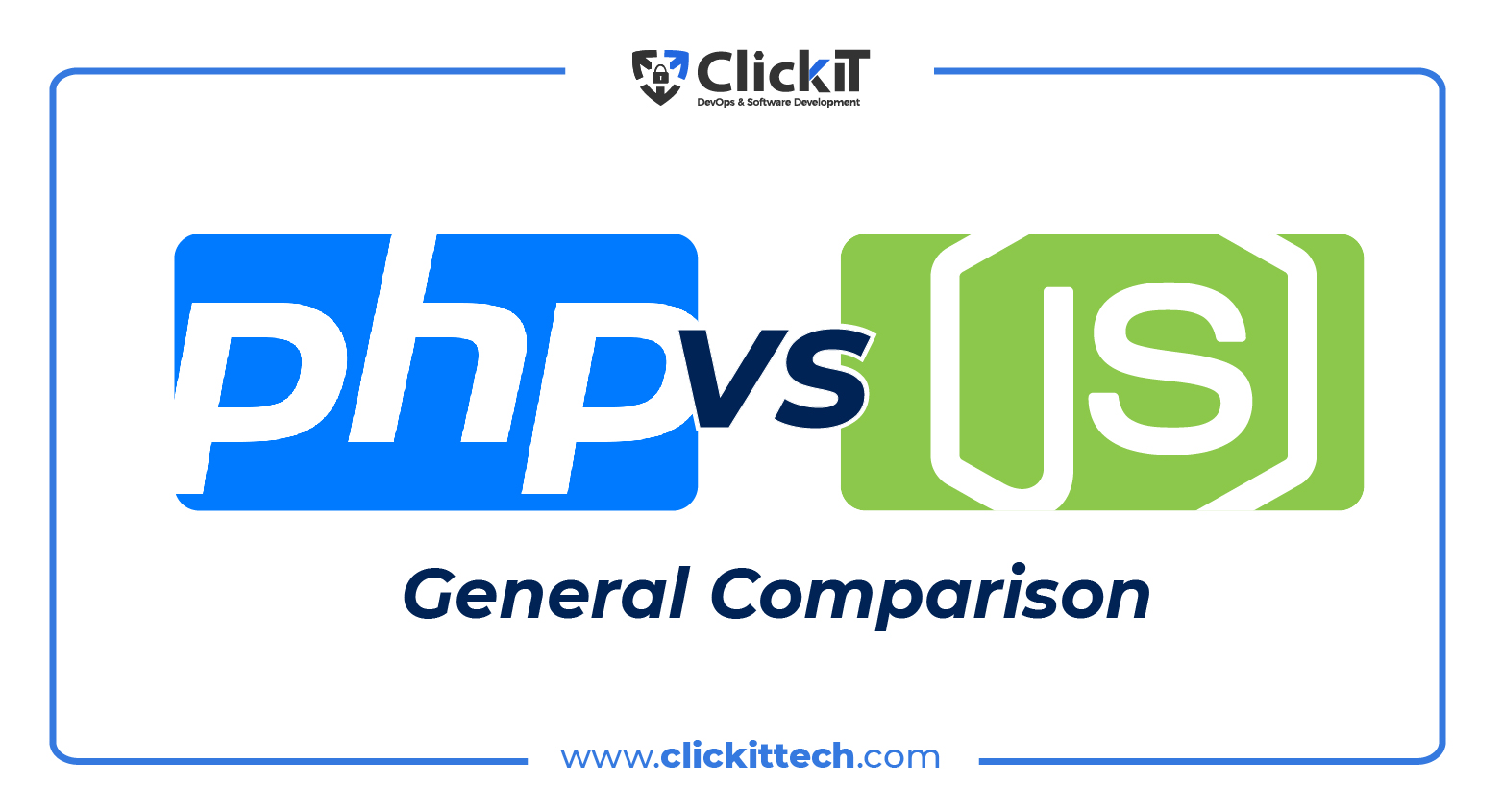
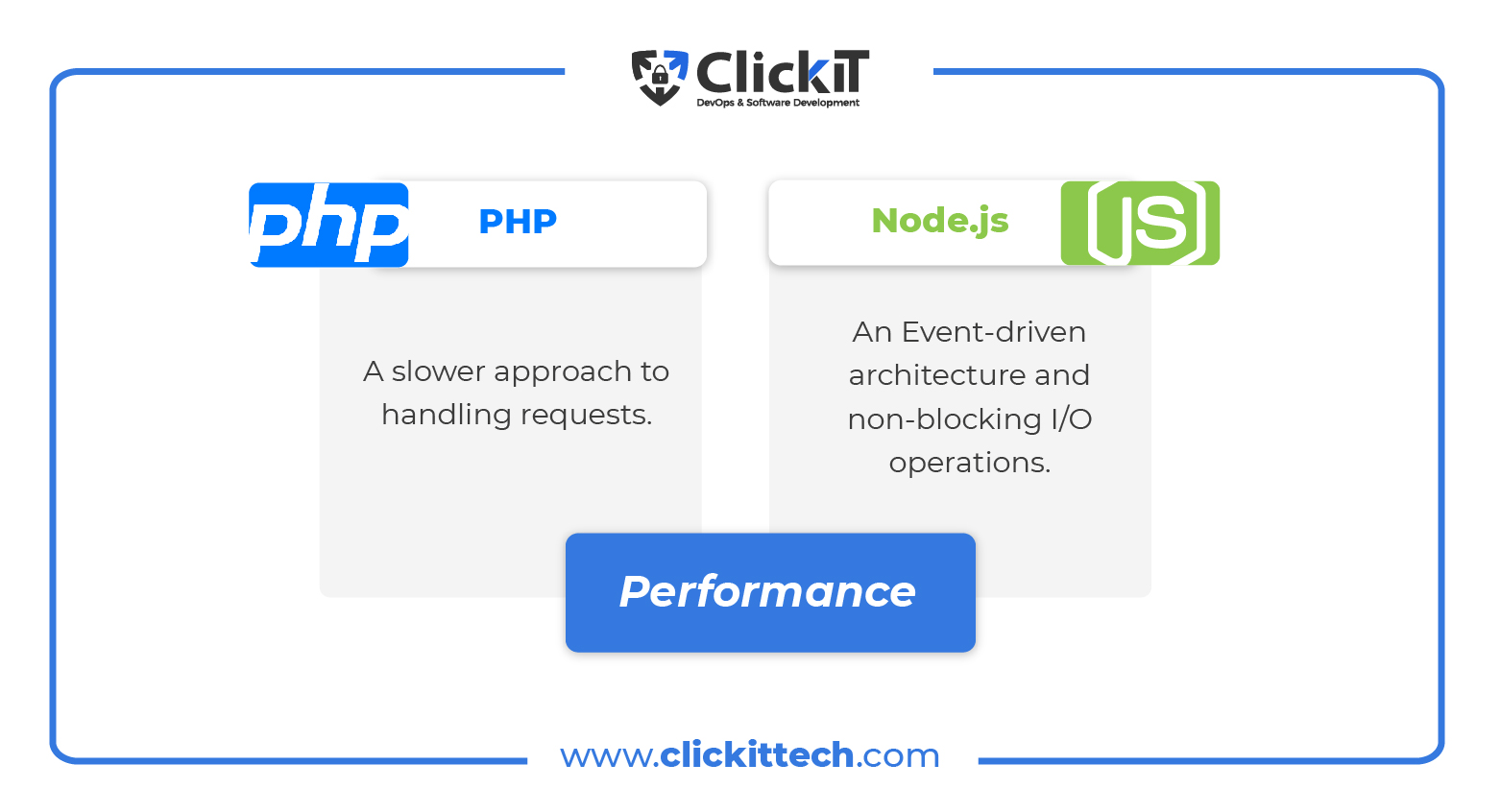
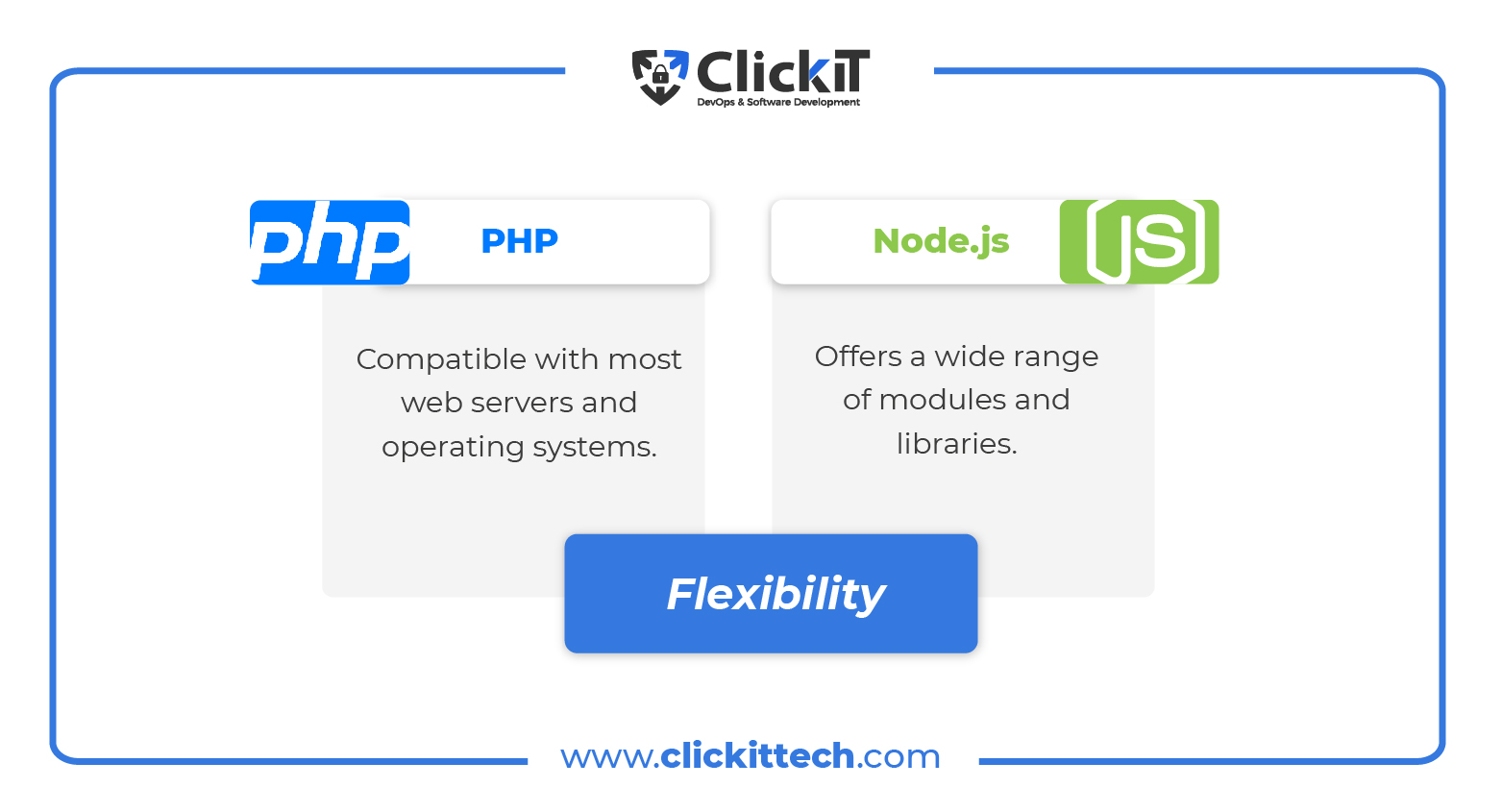
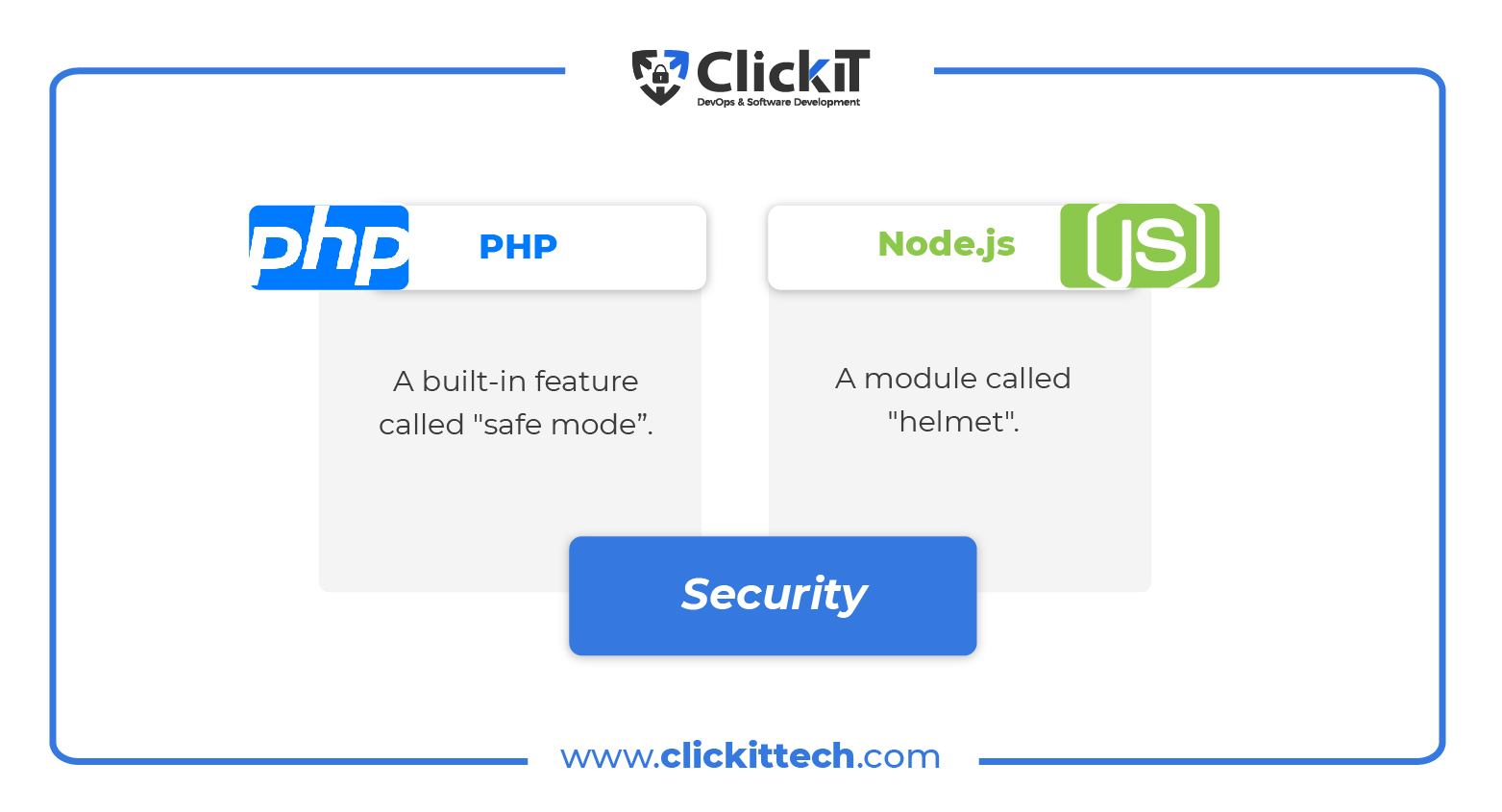
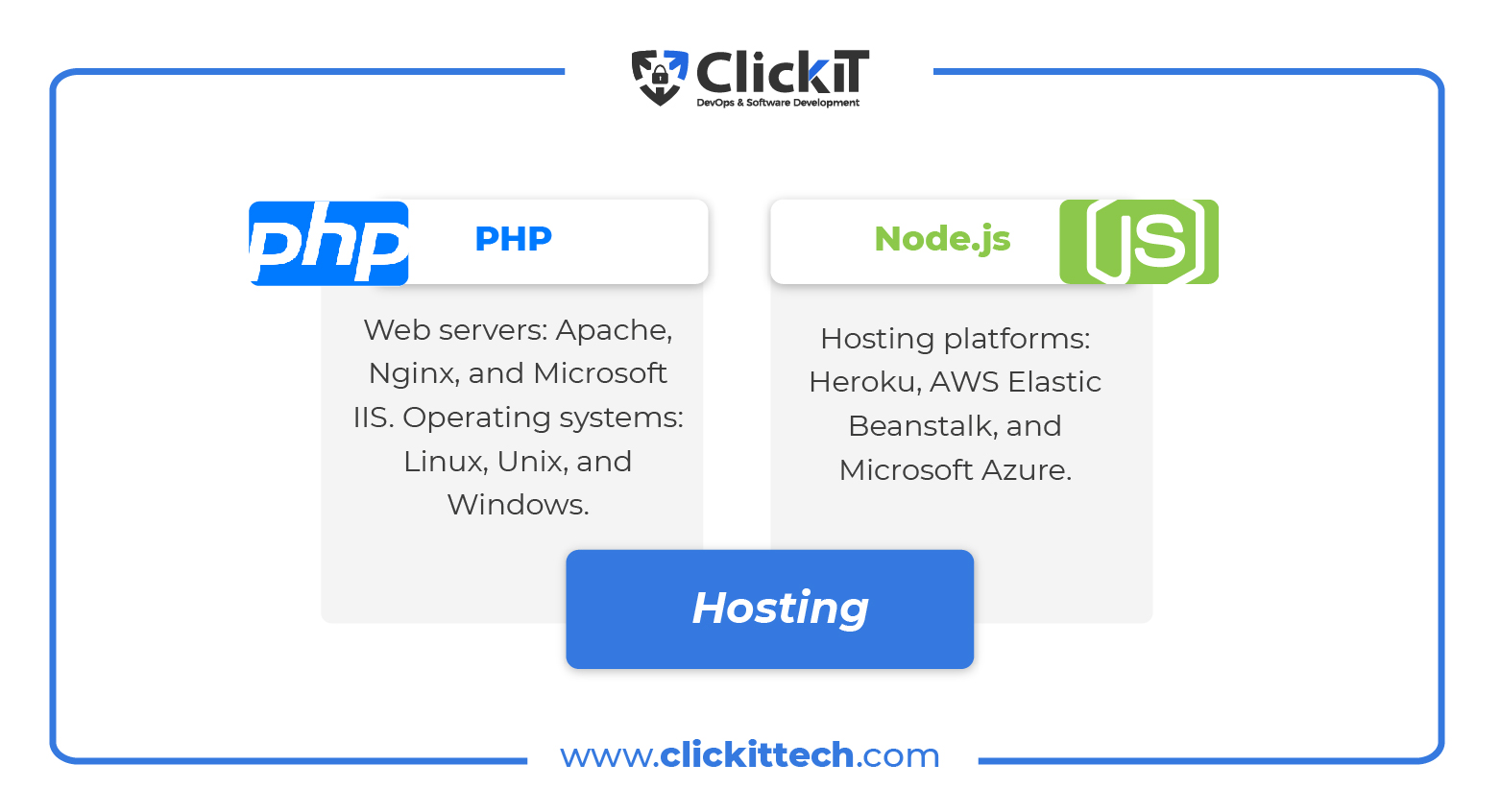
Performance
Let’s talk about PHP vs Node.js performance. Since PHP is an older technology, it uses a slower approach to handle requests. Additionally, it has a synchronous code execution method that runs each module in the sequence provided by the code. It delays loading and prevents concurrency by blocking a process until all of its operations have been finished.
In hindsight, you can link PHP with the HHVM Virtual Machine if you still wish to use it. Moreover, PHP web projects run on this virtual machine so you can enhance the speed of your PHP web app by a great deal. Despite this, Node.js remains the faster choice.
The nature of Node.js is asynchronous. It makes use of the JavaScript V8 engine, which contributes to faster execution and startup times. Node.js is event-driven, so it doesn’t hold up the processing of new requests while the old ones are being completed.
Concurrency is the term used to describe this order-independent execution. The parallelism of Node and JS together makes for a fantastic environment for creating high-performance apps.
In terms of personal preference, it ultimately depends on the specific use case and project requirements to evaluate PHP vs Node.js performance. For CPU-intensive tasks, PHP may be a better choice due to its quick execution speed and efficient caching mechanisms. However, for real-time and I/O-intensive applications, Node.js is likely the better option because of its event-driven architecture and non-blocking I/O operations.
Flexibility
PHP is compatible with most web servers and operating systems, which makes it a flexible choice for web development. It’s often used in content management systems (CMS) like WordPress, Drupal, and Joomla, which can be customized to create different types of websites.
Node.js is known for its flexibility in handling real-time applications, like chat applications or online games, and for its ability to handle a large number of concurrent connections. Node.js also offers a wide range of modules and libraries, making it a flexible choice for web development.
For more traditional web development projects that require a CMS or e-commerce functionality, PHP is likely the better choice. For real-time applications that require high scalability and a large number of concurrent connections, Node.js may be the better option.
Security
PHP has a built-in feature called “safe mode” that can be enabled to restrict access to certain files and directories, preventing malicious code from executing. Additionally, there are various security plugins and libraries available in PHP that can be used to enhance the security of web applications developed with it.
On the other hand, Node.js has a module called “helmet” which can be used to protect against common web attacks like XSS, CSRF, and clickjacking. Node.js also has a non-blocking I/O model, which can prevent denial of service (DoS) attacks by allowing the server to handle a large number of requests without becoming overwhelmed.
However, both PHP and Node.js can be vulnerable to attacks like SQL injection and cross-site scripting (XSS) if developers do not follow best practices for secure coding. For example, using prepared statements to prevent SQL injection attacks and properly sanitizing user input to prevent XSS attacks.
In terms of personal input, I believe that both PHP and Node.js can be secure if developers follow best practices and take necessary precautions. However, since Node.js has a more modern architecture and is designed for building scalable, high-performance applications, it may be a better choice for applications that require advanced security features.
Hosting
PHP can be easily hosted on most web servers, including Apache, Nginx, and Microsoft IIS. In addition, PHP is compatible with various operating systems like Linux, Unix, and Windows, making it easy to set up on most hosting platforms.
Node.js, on the other hand, is a more modern technology and requires a specific type of hosting. Some popular Node.js hosting platforms include Heroku, AWS Elastic Beanstalk, and Microsoft Azure. These platforms are specifically designed to run Node.js applications and can be more expensive than traditional hosting platforms.
If you’re working on a smaller project and are comfortable with traditional hosting solutions, PHP may be a better fit for you. However, if you’re working on a larger-scale project that requires real-time communication and scalability, Node.js and a dedicated hosting platform may be a better choice.
You can also read our blog Node.js vs Python.
Conclusion
So, is Node.js better than PHP? Not really. Choosing between PHP and Node.js for your back end largely depends on your specific project needs. Both have their advantages and drawbacks, and it ultimately comes down to factors like PHP vs Node js performance, flexibility, security, and hosting requirements.
PHP is a well-established language with a large community and extensive library support. It’s an excellent choice for building web applications and has proven its reliability over the years. Node.js, on the other hand, is a newer technology that excels in scalability, performance, and real-time web applications. It also has a great development community and extensive library support.
Ultimately, it’s up to the developer to decide which technology is best suited for their specific project requirements. Both PHP and Node.js have their strengths, and the final decision should be based on factors like project complexity, team expertise, and long-term maintenance requirements.
If you are searching for a software development service provider, ClickIT is the best option for all your Node.js and PHP development needs.
PHP vs Node.js FAQs
Comparing the two is challenging since PHP is a language and Nodejs is an environment/framework. Despite claims to the contrary, Node requires almost minimal learning for web developers compared to PHP.
Node.js is faster than PHP, yet PHP has more resources and support.
No, PHP cannot be entirely substituted. Although Node.js may be superior, PHP is still frequently advantageous and a better option, especially for smaller applications.
Yes. PHP is definitely more of a backend language than a frontend language, and here is where the majority of PHP programming is done.
Both PHP and Node.js have their strengths, and the best choice depends on your specific use case and preferences.
If you’re a beginner, you might also consider exploring both over time to broaden your skill set. Many developers today work with multiple languages and frameworks depending on the project requirements.








